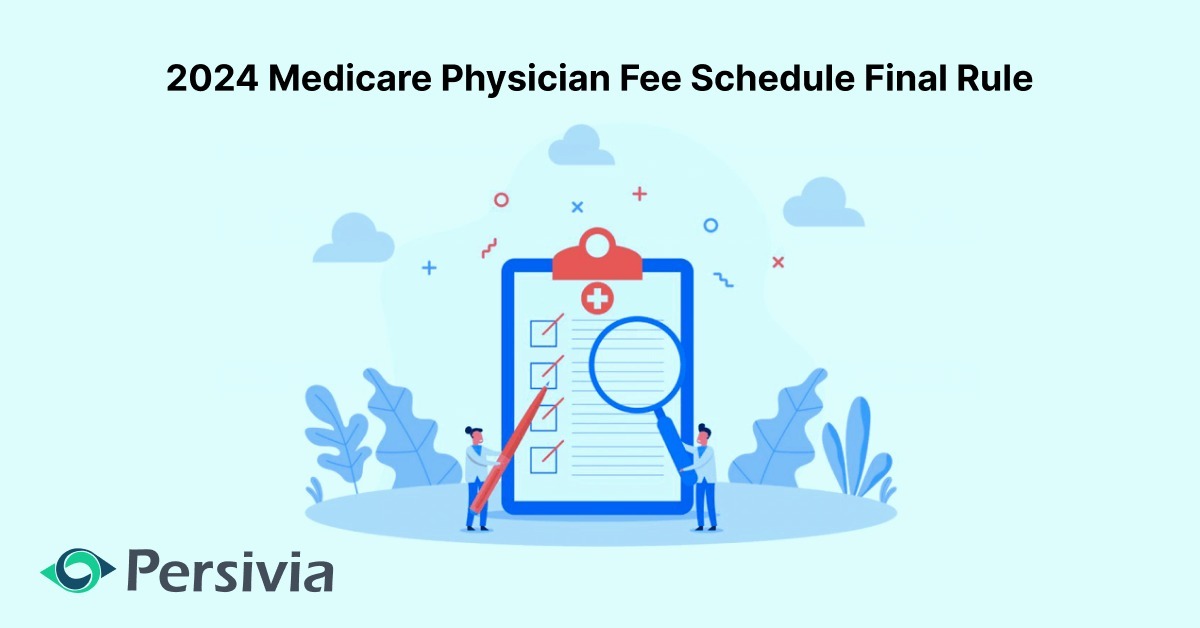The Centers for Medicare & Medicaid Services (CMS) just announced the 2024 Medicare Physician Fee Schedule final rule. This new rule introduces several ACO-friendly adjustments, which include refinements in quality reporting, fair benchmarking policies, a seamless shift to the new risk adjustment framework, retention of advance payments for ACOs transitioning to risk-based models, and additional support for ACOs managing high-cost patient populations.
Here’s what’s new for ACOs in the Medicare Shared Savings Program (MSSP):
1. Assignment Methodology
Expansion of Assignment Window: Effective January 1, 2025, a new step in the assignment methodology extends the timeframe for a physician visit to two years, improving the inclusion of beneficiaries who predominantly receive care from nurse practitioners, physician assistants, or clinical nurse specialists.
Inclusion of New Codes: Starting January 1, 2024, additional codes will be incorporated into the primary care services definition for ACO assignment.
Exclusion of RPM Services: CMS has opted not to finalize the inclusion of Remote Physiologic Monitoring services, acknowledging concerns raised during the comment period.
2. Benchmarks and Risk Adjustment:
Elimination of Negative Regional Adjustment: CMS has decided to remove the unfavorable regional adjustment factor.
Symmetrical Risk Score Cap: For agreements commencing in 2024, there will be a cap on risk score growth for both the ACO and its region, ensuring parity.
Gradual Introduction of V28 Risk Adjustment Model: Over three years, all ACOs will transition to the new V28 model, mirroring the approach taken with Medicare Advantage plans.
Gradual Introduction of V28 Risk Adjustment Model: Over three years, all ACOs will transition to the new V28 model, mirroring the approach taken with Medicare Advantage plans.
Consistent Risk Adjustment for New Agreements: The same risk adjustment model will be applied to both the performance year and the corresponding benchmark year, but only for ACOs entering new agreements from 2024 onwards.
3. Quality Measures
New Reporting Option for MSSP ACOs: For 2024, a fresh quality reporting pathway, the Medicare Clinical Quality Measures option, will be available, necessitating reports solely on Medicare beneficiaries who meet ACO assignment criteria.
Quarterly Patient List Sharing: In response to feedback from NAACOS, CMS will provide ACOs with a quarterly list of patients eligible for Medicare CQMs.
Advance Knowledge of Quality Targets: The Quality Performance Standard calculations will now utilize historical data, granting ACOs foresight into quality targets before the performance year.
Adjustments for Suppressed Measures: Adjustments will be made to the quality scoring requirements to account for suppressed measures.
Other Updates
Advance Investment Payment Policy Modifications: Policies are being adjusted to facilitate ACOs receiving advance payments to transition to a two-sided risk model and to provide exceptions to recoupment policies, among other updates.
Revised MSSP Eligibility and Definitions: Starting January 1, 2024, MSSP eligibility requirements will be updated, and definitions related to experience with performance-based risk will be clarified.
Alignment of CEHRT Requirements with MIPS: Shared Savings Program CEHRT requirements will be synchronized with MIPS, albeit with a one-year postponement.
In addition to these changes, there are several changes made to Physicians Payments and Quality Payment Program.
Key Changes to Physician Payment
Reduction of Medicare Conversion Factor: There will be a 3.4% decrease in the Medicare conversion factor, dropping from $33.89 to $32.74 for 2024.
Implementation of Complexity Add-On Code: The G2211 code for complexity during evaluation and management visits will be introduced with modifications.
New Codes for Community Health and SDOH: Codes are being established for community health integration services and social determinants of health risk assessment.
Updates to the Quality Payment Program (QPP)
Continuation of Current QP Determination Policy: The existing policy for making QP determinations at the APM-Entity level will persist through 2024.
MIPS Requirement Revisions for APMs: Modifications to MIPS requirements for Alternative Payment Models will be made.
Stable MIPS Performance Threshold: The MIPS performance threshold will remain at 75 points for the performance year 2024, with no increment.
For more detailed information on the final rule, additional resources are available.
- Final Rule Fact Sheet: https://public-inspection.federalregister.gov/2023-24184.pdf
- NAACOS Press Release: https://www.naacos.com/prmpfs
Table of Contents
